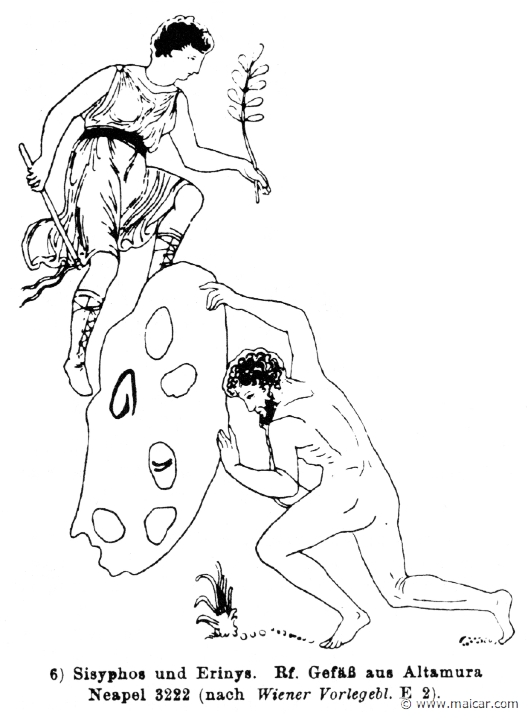 |
|
|

|
RIV-0971: Sisyphus, pushing the stone, watched by one of the Erinyes. Wilhelm Heinrich Roscher (Göttingen, 1845- Dresden, 1923), Ausfürliches Lexikon der griechisches und römisches Mythologie, 1884.
|
|
Sisyphus is the man who, being punished in Hades, rolls a stone
for ever.
Sisyphus founder of Corinth
Sisyphus is said to be the founder of Ephyra, a
city later called Corinth. Strange as it
may seem, he is also said to have received the
kingdom of Corinth from Medea. This is so because
her father Aeetes was
king in this region before he departed to Colchis,
leaving the kingdom to Bunus, son of Hermes and Alcidamea. When Bunus died, Epopeus 1 extended his own kingdom to include Corinth, and one of his
successors, Corinthus, became king and called the
land after himself, probably carried away by his
original mind. Upon the death of Corinthus, they say, the
Corinthians sent for Medea, who first ruled as queen but later handed over the kingdom to Sisyphus. This account, however, is not easy to reconcile with other descriptions of the curriculum of that remarkable woman.
Potential murderers murdered
Sisyphus married Tyro, but she killed her children by him because it had been prophesied that they would kill Tyro's father Salmoneus, who also was Sisyphus' brother. Sisyphus, who disliked his brother Salmoneus, inquired from the oracle in a cryptical way, how to obtain his brother's death, and the oracle replied that this could be done through having children by Tyro, because those children would kill his enemy. But when Tyro learned about the oracle, she killed her sons by Sisyphus. All this was unnecessary, for in time Zeus struck Salmoneus with a thunderbolt for his impiety, after Salmoneus had founded a city—Salmonia in Elis.
Autolycus 1's skill
Sisyphus also came into conflict with Hermes' son Autolycus 1, who received from his father the gift of being such a skilful thief that he could never be caught. For the god made him able to change whatever he stole into some other form or color—from white to black, or from black to white, from a hornless anirnal to a horned one, or from a horned one to a hornless. So Autolycus 1 kept continually stealing from the herds of Sisyphus without being detected. However, Sisyphus learned who the thief was simply because Autolycus 1's property was increasing while his own was decreasing. In order to catch the thief then, Sisyphus put a mark on the hooves of his cattle so that he could identify it. Thanks to that device, Sisyphus could take his cattle back, but while he was fetching it, he delayed at the thief's home where he seduced Autolycus 1's daughter Anticlia 1, who later, having married Laertes, gave birth to Odysseus—the doubt remaining as to who the Odysseus' real father was.
Punished in the Underworld
Sisyphus is best known for his punishment in the Underworld where he must roll a stone with his hands and head in an effort to heave it over the top of a hill. But regardless of how much he pushes, the stone rebounds backwards again and again. This punishment he endures because when Zeus had secretely carried off Aegina, he disclosed the secret to her father, the river god Asopus, who was then looking for his daughter.
|
| Family |
|
|
|
|
|
|
|
|
|
Merope 1 is sometimes called the seventh of the PLEIADES. She repents,
they say, for having married a mortal man, and from
shame she alone of the sisters hides herself.
Glaucus 1 married Eurymede 1 and fathered Bellerophon and Deliades, the latter of the brothers being accidentally killed by the former. Glaucus 1 himself was killed by his horses during a contest.
|
|
|
Thersander 2 had children Haliartus, Coronus 3 and Proetus 2, who were adopted by Athamas 1.
|
|
|
Almus also settled in Boeotia after receiving land from King Eteocles 2, son of Andreus 1, son of the river god Peneus. A village Almones was called after him.
|
|
|
Ornytion succeeded his father as king of Corinth.
|
|
|
|
Tyro is the daughter of Salmoneus and Alcidice, daughter of Aleus, son of Aphidas 1, son of Arcas 1, son of Zeus and Callisto. Salmoneus was
son of Aeolus 1 and
Enarete.
|
|
|
|
|
|
|
|
|

|
Genealogical Charts
Names in this chart: Aeolus 1, Aeson, Alcimede 1, Almus, Apollo, Ares, Asclepius, Atlas, Bellerophon, Chryse 1, Chryses 1, Chrysogenia, Clymene 3, Coronis 2, Cretheus 1, Damophon, Deidamia 2, Deimachus 1, Deion, Deucalion 1, Diomedia, Doridas, Enarete, Eurymede 1, Evander 3, Glaucus 1, Glaucus 3, Hellen 1, Hippasus 11, Hippolochus 1, Hyanthidas, Iobates, Iphiclus 1, Ischys, Jason, Laodamia 1, Leucippe 4, Maera 4, Medea, Merope 1, Minyas, Ornytion, Orseis, Philonoe, Phlegyas 1, Phylacus 1, Pleione, Poseidon, Proetus 2, Propodas, Protesilaus, Pyrrha 1, Salmoneus, Sarpedon 1, Sarpedon 3, Sisyphus, Thersander 2, Thoas 8, Tyro, Woman 11 Theban, Zeus. |
|
| Related sections |
Sisyphus in GROUPS: ODYSSEUS IN HADES |
|
|
Sources
Abbreviations |
Apd.1.7.3, 1.9.3, 3.12.6;
Hes.CWE.4; Hom.Il.6.154;
Hom.Od.11.593ff.; Hyg.Ast.2.21;
Hyg.Fab.60, 201; Pau.2.3.11, 2.4.3, 9.34.7-10. |
|
|